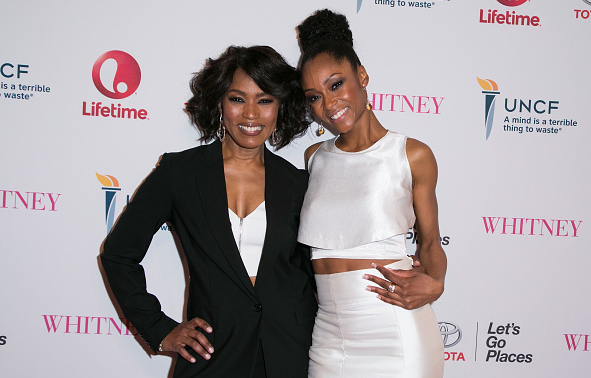
by Janice Littlejohn
“Yeah, we’re that mythical creature, the female director,” says Angela Bassett of directing the Lifetime biopic, Whitney (premiering Saturday, 8 p.m. ET/PT), keenly aware of this most rare break in Hollywood – particularly for a woman of color. “I didn’t think about it, but I was proud to do it and grateful to have the opportunity. But yeah, it’s a big deal. It’s a big thing, you know. I kid saying the ‘mythical creature,’ but it’s true because there are still very few.” And even more devastating still, given the Academy’s snub this week of Selma’s Ava DuVernay for a much deserved Best Director nomination. Frustrating still, following the leaked emails at Sony revealing their top 10 go-to directors: all male, all white.
Whitney, then, becomes a radical achievement – whether critics give it props or not – simply by its perspective: a black woman celebrating the story of one of her own, and one with whom the 56-year-old actress co-starred in 1995’s Waiting to Exhale. The film, which centers on what Bassett calls “the glorious years” of Whitney Houston’s rocketing music career and her courtship, and eventual marriage, to Bobby Brown, is a story Bassett believes required a certain gentleness that no man could bring to it.
Bassett’s reveal of Brown presents a heartfelt gentleness and grace some might not expect. “In this movie, it’s not how we viewed Bobby,” Bassett says. “It’s how she viewed Bobby.”
But also how Bassett knew him. “They got together in ’89, and we did Exhale shortly after they got married. Of course, I’m thinking, ‘Yeah, he’s the bad boy of R&B.’ And, ‘Oh yes, she’s the pop princess. But the day that he visited us on set on Exhale…he was caring, he was nurturing, he was attentive. He was quiet. He was respectful. He was charismatic. He was all of those things. He’s complicated. Like all of us.”
Filmed between acting in seasons of American Horror Story (Coven and Freak Show) in New Orleans, Bassett often called on Academy Award-winning director, Kathryn Bigelow, for advice on issues from storyboarding to locations. In the end, “I learned that I couldn’t control ever’thang,” she says with a fervent emphasis and a laugh. “Sometimes you have to just wait and sit and let it play out.”
On screen, Bassett is no stranger to the biopic, having played such iconic women as Tina Turner (for which she received a Best Actress Academy Award nomination in 1994 for What’s Love Got to Do With It), Rosa Parks and Coretta Scott King, and she was mindful of wanting to honor Houston. And despite the objections by Houston’s family over the project being made – not to mention the wild Twitter rants from Houston’s 21-year-old daughter, Bobbi Kristina Brown that she had not be cast to play her mother in the film -- Bassett believes Whitney “would be pleased,” she says. “And that’s all I wanted to do, make her proud. Because I felt her spirit all during the movie.”
Photo: Vincent Sandoval/Getty Images
Janice Rhoshalle Littlejohn is a journalist and co-author of Swirling: How to Date, Mate, and Relate Mixing Race, Culture, and Creed (Atria/Simon & Schuster). She is currently co-writing the indie-feature, Lovers in Their Right Mind, a dramatic comedy exploring the romance between a black woman and an Iranian man. Connect with her on Twitter @JaniceRhoshalle
